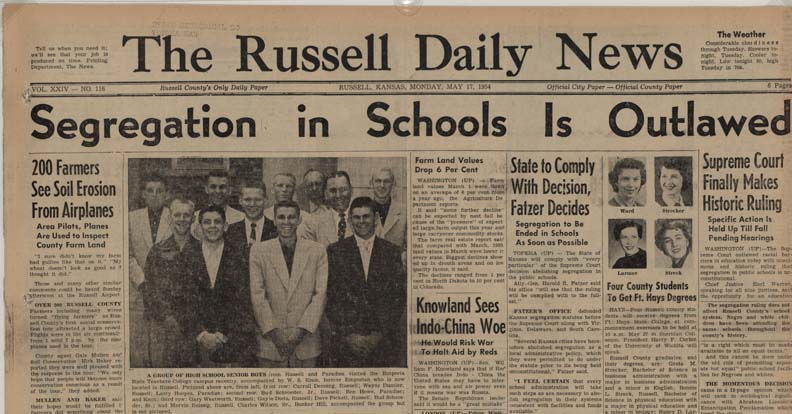[ad_1]
Legal History
Brown v. Board of Education should be renamed, group plans to tell Supreme Court

The front page of the Russell (Kansas) Daily News on May 17, 1954, announcing that school segregation is outlawed. Image from the Library of Congress.
A lawyer in Camden, South Carolina, plans to ask the U.S. Supreme Court to rename Brown v. Board of Education for the first case taken to federal court in a quest to eliminate the separate-but-equal doctrine.
Lawyer Tom Mullikin is working with a group that says the case should be renamed Briggs v. Elliott for the case filed in May 1950 in Clarendon County, South Carolina, the Post and Courier reports.
Briggs was one of five cases consolidated before the Supreme Court as part of the Brown v. Board of Education decision in May 1954.
Mullikin said the Supreme Court broke with tradition when it named the consolidated cases.
“I’m very comfortable saying this is a breach of the court’s precedents,” Mullikin told the Post and Courier. “There’s absolutely nothing in the record that would support this case being named Brown v. Board.”
One of the lawyers on the Briggs case was Thurgood Marshall, who argued Brown v. Board of Education before the Supreme Court. At first, the plaintiffs in Briggs sought only an equal education, but they later amended the suit to ask for desegregated schools.
Records in the South Carolina archives cited by the Post and Courier showed that the defendant school district was spending $179 for each white student but only $43 for each Black student.
Nathaniel Briggs is one of the name-change backers. He is the son of the Briggs plaintiff Harry Briggs, who was fired from his job as a gas station attendant after he signed a petition seeking equal resources for Black students. Their school had no indoor plumbing and no funding for a school bus. Nathaniel Briggs’ mother, Harry’s wife, also lost her job at a motel.
Briggs told the Post and Courier that his “life’s work” is to tell the story and to change the case name.
Cecil Williams, a South Carolina civil rights photographer, is a leading backer of the effort to rename the case. Williams told the Post and Courier that the Supreme Court has never renamed a case that has already been decided.
“Many will call it crazy,” he said. “It might be laughed out of court.”
But he backs the name change “because this was the epitome of a hijacking of the legacy, the history and the heritage of a group of people.”
Hat tip to How Appealing.
[ad_2]




